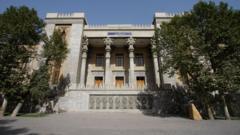Supreme Leader Ayatollah Ali Khamenei has cast significant doubt on the likelihood of reaching a new nuclear agreement with the United States, labeling their demands regarding uranium enrichment as "excessive and outrageous."
Khamenei Skeptical of US Nuclear Agreement Prospects

Khamenei Skeptical of US Nuclear Agreement Prospects
Iran's Supreme Leader expresses doubt over potential success of upcoming nuclear negotiations with the US, criticizing American demands.
In remarks made during a ceremony honoring late President Ebrahim Raisi, Khamenei stated, “We don't think it will lead to any outcome. We don’t know what will happen.” This skepticism follows recent comments from US President Donald Trump who indicated that Iran had shown willingness to agree to certain terms after multiple rounds of negotiations mediated by Oman.
Ahead of a crucial round of talks set to take place this weekend, Iran's chief negotiator strongly countered Trump’s assertions, emphasizing that the country would not commit to halting its production of enriched uranium. While Iran maintains that its nuclear pursuits are entirely peaceful, it has reportedly surpassed limits imposed by the previous nuclear deal due to reinstated US sanctions, amassing a stockpile of highly-enriched uranium that could potentially be weaponized.
Khamenei took the opportunity to praise Raisi’s refusal of direct negotiations with the US during his presidency, asserting, “He clearly said 'no' without ambiguity.” The Supreme Leader dismissed the outcomes of previous talks held under Raisi's predecessor, suggesting that prospects remain dim under the current administration led by reformist Masoud Pezeshkian.
The Iranian leader further criticized the US for adopting a condescending stance, specifically regarding enrichment capabilities, and stated, “Saying they will not allow Iran to enrich is a big mistake.”
US Special Envoy Steve Witkoff shared his perspective on the situation, highlighting the US's firm stance against any enrichment that could enable weaponization technology, while Iranian Foreign Minister Abbas Araqchi countered, arguing that realistic negotiations could not ignore Iran’s right to enrichment.
The complexities of the new agreement hinge on potential sanctions relief in exchange for nuclear activity limitations, reminiscent of the 2015 deal that saw Iran agreeing to restrictions on its nuclear program in return for economic incentives. Recent tensions have heightened concerns over Iran's stockpile of uranium enriched to 60%, dangerously close to weapons-grade materials.
As the world watches, the upcoming negotiations represent a critical point in the ongoing dialogue surrounding nuclear capabilities and geopolitical stability.
Ahead of a crucial round of talks set to take place this weekend, Iran's chief negotiator strongly countered Trump’s assertions, emphasizing that the country would not commit to halting its production of enriched uranium. While Iran maintains that its nuclear pursuits are entirely peaceful, it has reportedly surpassed limits imposed by the previous nuclear deal due to reinstated US sanctions, amassing a stockpile of highly-enriched uranium that could potentially be weaponized.
Khamenei took the opportunity to praise Raisi’s refusal of direct negotiations with the US during his presidency, asserting, “He clearly said 'no' without ambiguity.” The Supreme Leader dismissed the outcomes of previous talks held under Raisi's predecessor, suggesting that prospects remain dim under the current administration led by reformist Masoud Pezeshkian.
The Iranian leader further criticized the US for adopting a condescending stance, specifically regarding enrichment capabilities, and stated, “Saying they will not allow Iran to enrich is a big mistake.”
US Special Envoy Steve Witkoff shared his perspective on the situation, highlighting the US's firm stance against any enrichment that could enable weaponization technology, while Iranian Foreign Minister Abbas Araqchi countered, arguing that realistic negotiations could not ignore Iran’s right to enrichment.
The complexities of the new agreement hinge on potential sanctions relief in exchange for nuclear activity limitations, reminiscent of the 2015 deal that saw Iran agreeing to restrictions on its nuclear program in return for economic incentives. Recent tensions have heightened concerns over Iran's stockpile of uranium enriched to 60%, dangerously close to weapons-grade materials.
As the world watches, the upcoming negotiations represent a critical point in the ongoing dialogue surrounding nuclear capabilities and geopolitical stability.




















